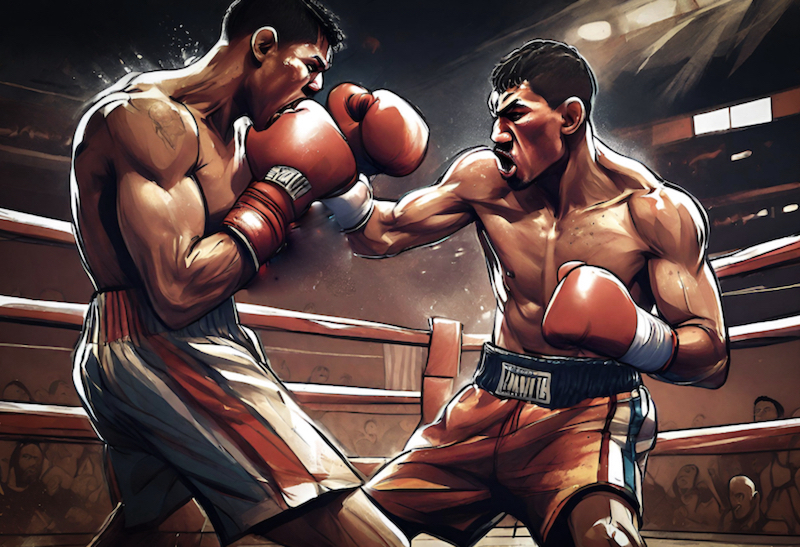(United States) — The noble art of boxing has always danced gracefully on the stage of social change, and the 2020s have been no exception. The days of smoke-filled arenas and colossal icons like Muhammad Ali and Mike Tyson are gone.
The landscape of contemporary boxing presents itself as a more cunning and strategic game, putting some old-school pugilists on the ropes. So, what exactly has changed, and why is Mexican phenomenon Saul “Canelo” Alvarez often in the eye of the storm of criticism?
First, the money game has undergone a metamorphosis. Broadcasting rights and pay-per-view deals now far exceed fight earnings, resulting in fewer but more calculated fights. The days of grueling 15-round wars have faded, and today, champions like Canelo choose their opponents, prioritizing mega-million dollar fights over technical and unpredictable battles.
This strategic approach, while financially attractive to pugilists of this era, irritates purists of the art of boxing. They still long for the era of iron jaws and unbreakable spirit, where fighters proved their worth in the crucible of the ring, not in the negotiation room.
Canelo’s fighting style embodies this evolution. The Mexican champion has been described by sports experts like Max Kellerman and Teddy Atlas as an extraordinary counterpuncher who relies on precision, timing, and calculated movements. While undeniably effective, this cerebral approach lacks the visceral excitement of the gladiators of yore. Others believe that Canelo prioritizes avoiding risk over delivering valiant and dazzling fights.
Critics of the pugilist, such as former Mexican champion Juan Manuel “Dinamita” Marquez, have characterized Canelo’s cautious approach as “fearful.” Before Canelo’s fight against Jermell Charlo in May 2023, Márquez commented, “If you’re afraid, why get into boxing?”
Nacho Beristain, the revered Mexican boxing trainer, has labeled Canelo as an “abusive” pugilist, due to the weight difference between the champion and many of his opponents. Boxing fundamentalists like him miss the “Mexican style” of aggressive fighting personified by boxers like “Dinamita” Márquez, Julio Cesar Chavez, and other legends of the sport.
The protection of some champions by their promoters, with the goal of preventing them from facing dangerous opponents, and the millions of dollars in purses prioritized over pugilistic merit, have led veterans to perceive that the art of boxing is being sacrificed for the sake of efficiency, leaving the sport with less heart and bank accounts that measure in millions.

The influence of Mixed Martial Arts on boxing
One factor to consider is that the rise of Mixed Martial Arts (MMA) has cast a long shadow over boxing. The fusion of disciplines in MMA has attracted a new generation of fans of bloody fights, leaving boxing struggling to maintain its relevance.
Promoters have responded by incorporating elements of MMA into boxing, with a greater emphasis on takedowns and grappling. This hybridization, while pragmatic, further dilutes the purity of the traditional boxing experience, alienating orthodox fans who appreciate the sport’s distinctive identity.
However, not all is pessimism. Boxing still has a cast of captivating characters, with young stars like Devin Haney, Naoya Inoue and Gervonta Davis, to name a few, injecting new energy and enthusiasm into the sport. Another favorable factor may include the growing popularity of women’s boxing and the rise of independent promotions that offer glimpses of a brighter future that embraces tradition and innovation.
Fistiana and its ability to reinvent itself
The metamorphosis of boxing is a reflection of our times. Contemporary boxing is a sport that is adapting to a changing media landscape and the evolution of fan preferences. While traditionalists may lament the loss of the distinctive character of the golden age, boxing’s ability to reinvent itself is precisely what has kept it alive for centuries.
Therefore, the next time you hear a veteran complain about Canelo or the lack of greatness, remember, boxing is simply moving to the beat of a new era, one where brand management triumphs over boxing technique and pay-per-view events are the real winners.
And who knows, perhaps one day a new generation of champions will emerge, one that bridges the gap between the old and the new, a pugilist who can satisfy both purists and pragmatists, demonstrating that the art of boxing, even in its transformed state, can still have a major impact.
© 2023 - 2024, Eduardo Barraza. All rights reserved.





